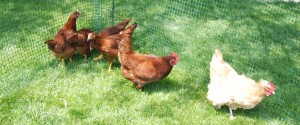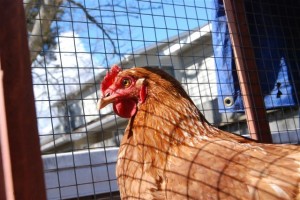I had an interesting and enlightening (albeit short) interaction with a potential customer at Farmer’s Market last Wednesday about the 2nd St. Chicken Ranch eggs. The customer wanted to know if the eggs were from “free range” chickens. A valid enough question. I said no, they lived in a coop with pen…and she walked away. I was a little stunned at by that reaction. After all, my girls are within city limits and you can’t exactly “free range” (plus it is against the city ordinance).
I lost that sale (however I did sell all the eggs I took to the Market), but I was reminded of how confusing the trendy food “marketing” terms are and how little consumers know about them.
Labels including organic, natural, free range, free roaming, cage free and pastured poultry are all over egg cartons. But what, exactly do they mean? Here’s what the USDA has to say:
Labels Regulated by the USDA
 Free Range or Free Roaming: This label is only regulated for poultry – not eggs. It requires that the poultry has been allowed access to the outside. No specific time outside or stocking density is required. This label does not require 3rd party certification.
Free Range or Free Roaming: This label is only regulated for poultry – not eggs. It requires that the poultry has been allowed access to the outside. No specific time outside or stocking density is required. This label does not require 3rd party certification.
Natural: This label is for products that contain no artificial ingredient or added color and is only minimally processed. The label must explain the use of “natural” such as no artificial colorings or ingredients. The natural label does not have to meet requirements for feed, antibiotic use or pasture and does not require 3rd party certification.
Organic: The USDA organic seal verifies that producers met animal health and welfare standards, did not use antibiotics or growth hormones, used 100% organic feed, and provided animals with access to the outdoors. This label requires 3rd party certification.
Labels Unregulated by the USDA
 Cage-Free: Most commercially produced eggs are from hens that are kept in small cages. A cage-free label does not guarantee that the bird had access to the outdoors. In addition, this term is not regulated by USDA, and the label does not require third-party certification.
Cage-Free: Most commercially produced eggs are from hens that are kept in small cages. A cage-free label does not guarantee that the bird had access to the outdoors. In addition, this term is not regulated by USDA, and the label does not require third-party certification.
Pastured Poultry: This term refers to poultry management using a modified free-range system where birds are raised on pasture but provided with shelters that can be moved by hand or tractor. Poultry is often moved daily. Chickens can get up to 20 percent of feed from pasture forage in these systems. This term is not regulated by USDA, and the label does not require third-party certification.
When I think of “free range” chickens, I imagine hens running in a large pasture, happily eating grass and bugs. Something my girls do get to do — inside their “play-pen.” The truth is, according to the USDA, my girls ARE free range, free roaming, natural, cage free and pastured (even if the pasture is a backyard). I meet the labeling standards.
I won’t be losing any sales in the future and next time someone asks about the free range-ness of my hens, I can say for certain, “yes, they are!”
I will have a limited number of eggs for sale at the Wednesday Farmer’s Market in downtown Coeur d’Alene, $2 per half dozen, $4 per dozen.


This is a great article, now whenever I have to supplement eggs from my hens I’ll look for the organic label. What has always miffed me is the “fed only veggie” label. If you own chickens you know how ridiculous that is.
I agree…the labeling system leaves much to be desired and I believe only causes more confusion for the consumer. It’s really marketing – and I understand that, as a marketing professional. But the terms are misleading and often used incorrectly. If you want organic – make sure the label says “organic” – otherwise it may just be the work of a good copywriter (and factory hens)! — Candace